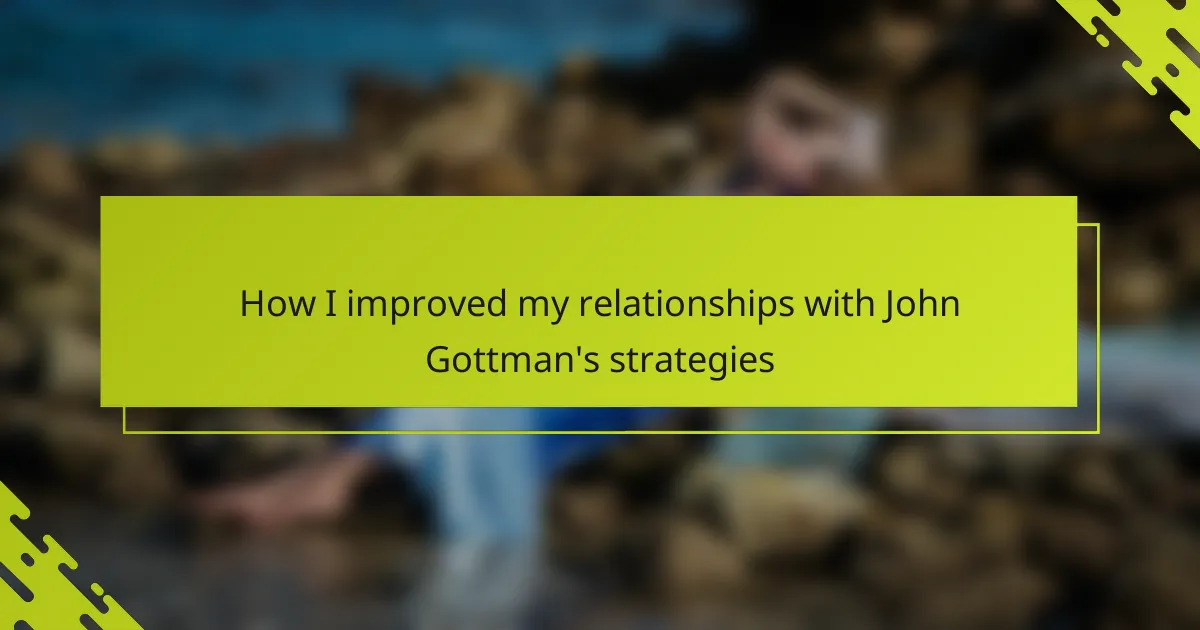Key takeaways
- John Gottman’s strategies emphasize the importance of small daily interactions and recognizing destructive communication patterns, known as the “Four Horsemen.”
- Developing a culture of connection through bids for attention and affection can significantly enhance emotional intimacy in relationships.
- Active listening, emotional check-ins, and practicing gratitude are key practices to strengthen relationships and maintain long-term health.
- Creating emotional safety and nurturing curiosity about each other helps keep the relationship dynamic and resilient over time.
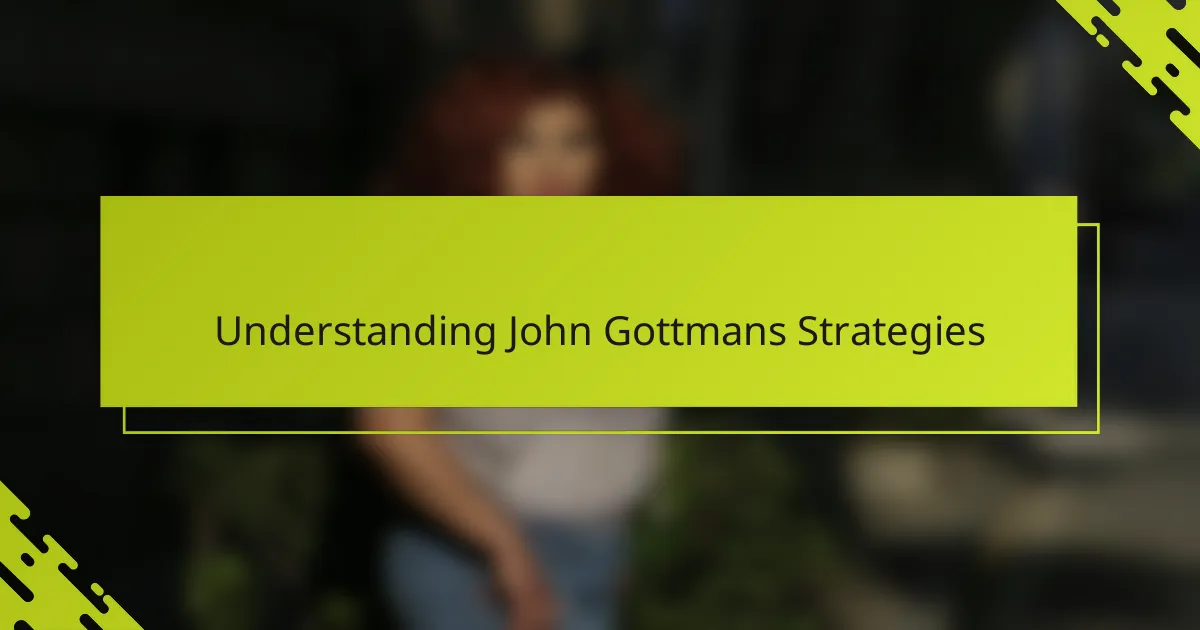
Understanding John Gottmans Strategies
John Gottman’s strategies revolve around understanding the subtle dynamics that strengthen or weaken relationships. I was particularly struck by his focus on small everyday interactions—things many of us overlook but that actually shape our emotional connection. It made me wonder, have I been paying enough attention to the little moments with my partner?
What stands out to me is Gottman’s idea of the “Four Horsemen”—criticism, contempt, defensiveness, and stonewalling. Recognizing these destructive patterns in my own communication was eye-opening and honestly quite uncomfortable. But facing these habits head-on was the first step toward changing them, which I believe is essential for building healthier relationships.
Gottman doesn’t just highlight challenges; his approach is deeply hopeful. He emphasizes nurturing “bids” for connection—those small requests for attention or affection—and responding positively to them. Once I started tuning into these bids, I realized how much richer and more rewarding my interactions became, which feels especially meaningful in queer women’s relationships where mutual understanding is so vital.
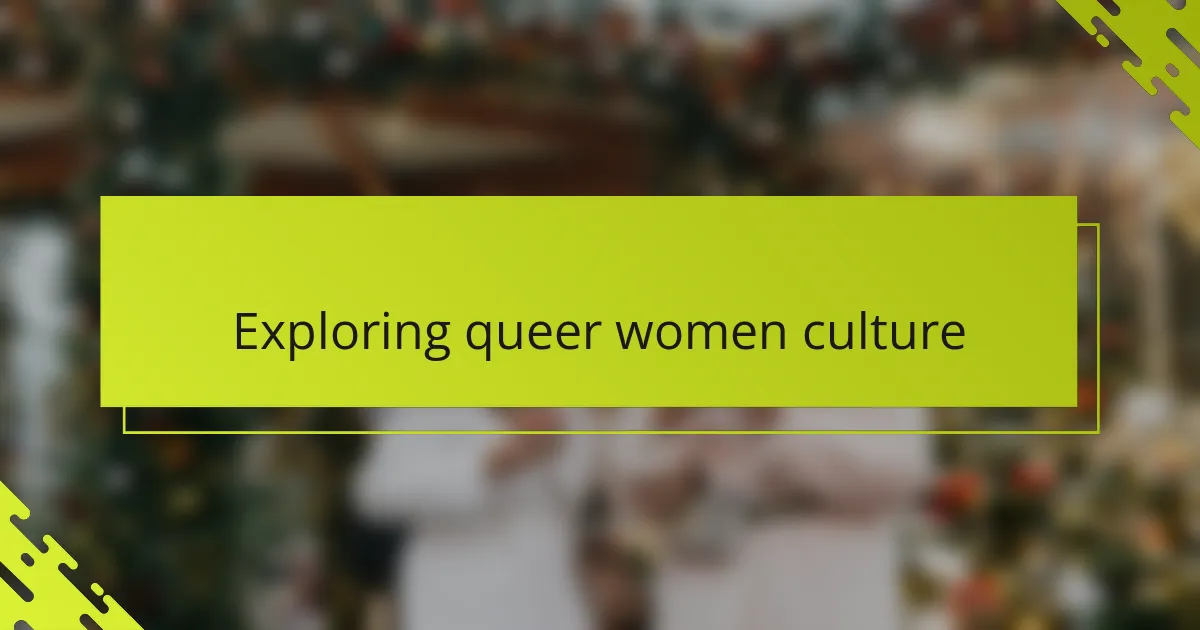
Exploring Queer Women Culture
Queer women culture is a vibrant tapestry of resilience, creativity, and deep connection. From my experience, it’s a space where authenticity is not just encouraged—it’s necessary. Have you ever felt the unique comfort in sharing a glance or a story with someone who truly “gets” your journey?
What’s fascinating to me is how community plays such a pivotal role. It’s not just about romantic relationships but the whole network of friendships, chosen families, and shared experiences that define queer women’s lives. These bonds create a powerful sense of belonging that often feels rare in broader society.
I remember a moment when, surrounded by queer women friends, I realized how our relationships embody a mix of trust, humor, and fierce support. It’s a culture that teaches you to listen deeply and hold space for others, which, honestly, has reshaped how I approach every connection. Isn’t that something we all crave?
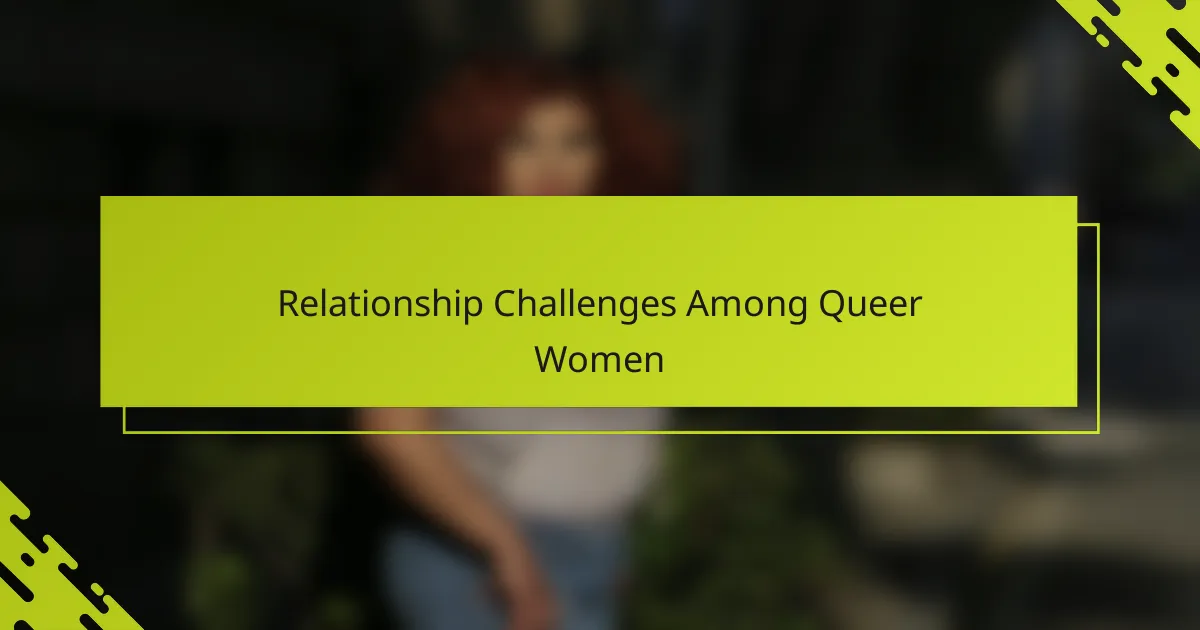
Relationship Challenges Among Queer Women
Navigating relationships as queer women brings its own set of challenges that I hadn’t fully appreciated until I faced them head-on. For instance, the pressure to constantly prove the legitimacy of our partnerships—both to others and sometimes even to ourselves—can create a low hum of doubt that wears on intimacy. Have you ever felt this tension, where external skepticism seeps into your personal space?
Another layer I’ve encountered is the complex dance around identity and communication. Queer women often juggle multiple facets of self that don’t always align easily with traditional relationship scripts. I recall times when my partner and I struggled to find common language for our emotions or expectations, leaving us looping in misunderstandings that felt hard to escape.
Then there’s the impact of social isolation, which is surprisingly common. Many queer women experience moments where their relationship feels invisible or unsupported, leading to loneliness even within connection. That void made me realize how critical it is to seek strategies—like Gottman’s—that actively build bridges rather than leave gaps untouched. Without intentional effort, those gaps seem to grow wider.
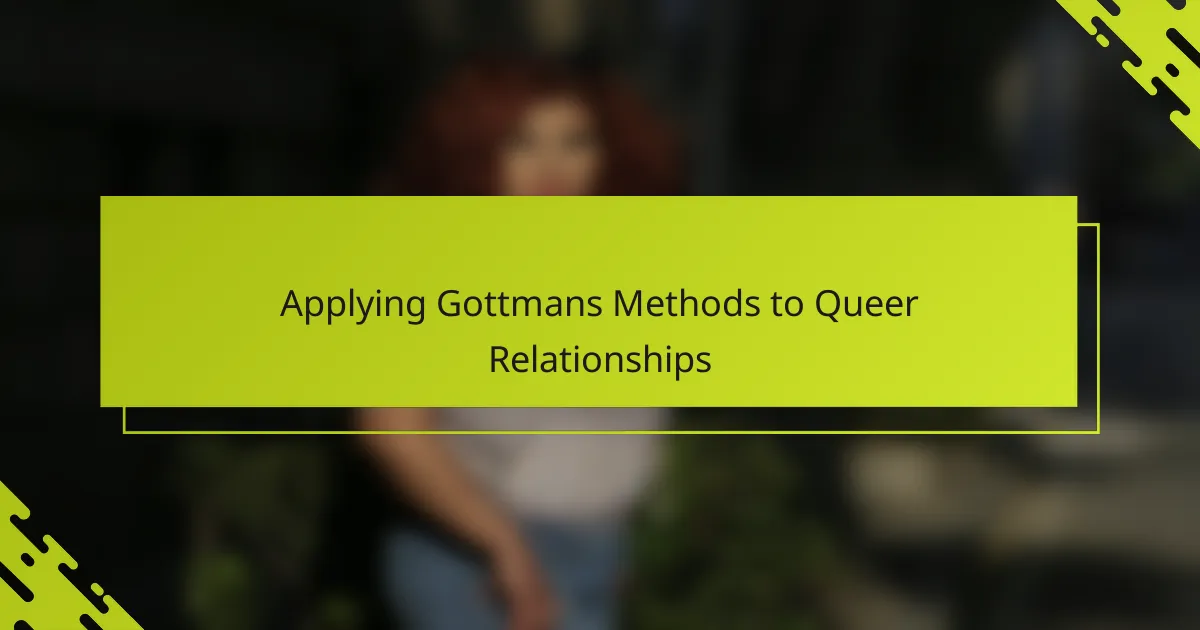
Applying Gottmans Methods to Queer Relationships
Applying Gottman’s methods to queer relationships felt like discovering a new language for connection. For example, when my partner and I started recognizing and gently redirecting the “Four Horsemen” in our talks, tensions eased, and empathy naturally took their place. Have you noticed how just naming harmful patterns can make them lose some of their power?
What resonated deeply with me was the idea of tuning into bids for connection. In queer relationships, where communication can sometimes feel like navigating uncharted waters, those small invitations—whether a touch, a glance, or a question—became lifelines. Responding to them not only strengthened our bond but also made me feel truly seen and valued.
That said, applying these strategies isn’t a flawless process. There were moments I stumbled, especially when vulnerability felt risky or when old habits crept back in. Still, each effort to engage Gottman’s tools felt like planting seeds of trust and understanding, which, over time, blossomed into a more resilient and joyful partnership. Have you tried this kind of intentional care with your own relationships?
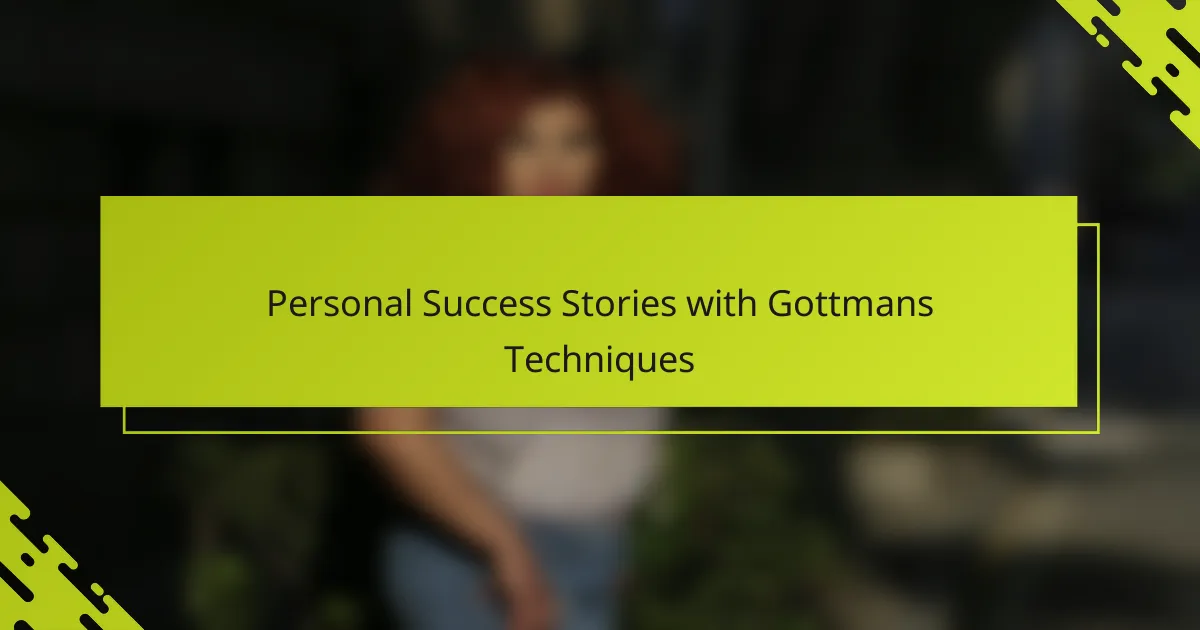
Personal Success Stories with Gottmans Techniques
One moment that sticks with me is when my partner and I caught ourselves slipping into criticism—the first of Gottman’s Four Horsemen. Instead of letting it spiral, we paused, acknowledged it, and used gentle humor to reset the mood. That simple shift turned an argument into an opportunity for connection, which honestly surprised me.
I also noticed how responding to bids for connection transformed our daily life. A casual “How was your day?” or even just a smile became a thread weaving us closer. It’s impressive how these tiny exchanges, often dismissed as routine, grew into something sustaining and healing. Have you ever realized how powerful those everyday moments can be?
Of course, it wasn’t all smooth sailing. There were times I doubted whether these techniques could really unravel years of unspoken hurts. But each time we chose kindness over defensiveness, a new layer of trust emerged. Looking back, I see how embracing vulnerability—not perfection—was the real breakthrough. Wouldn’t you agree that’s where deeper connection truly begins?
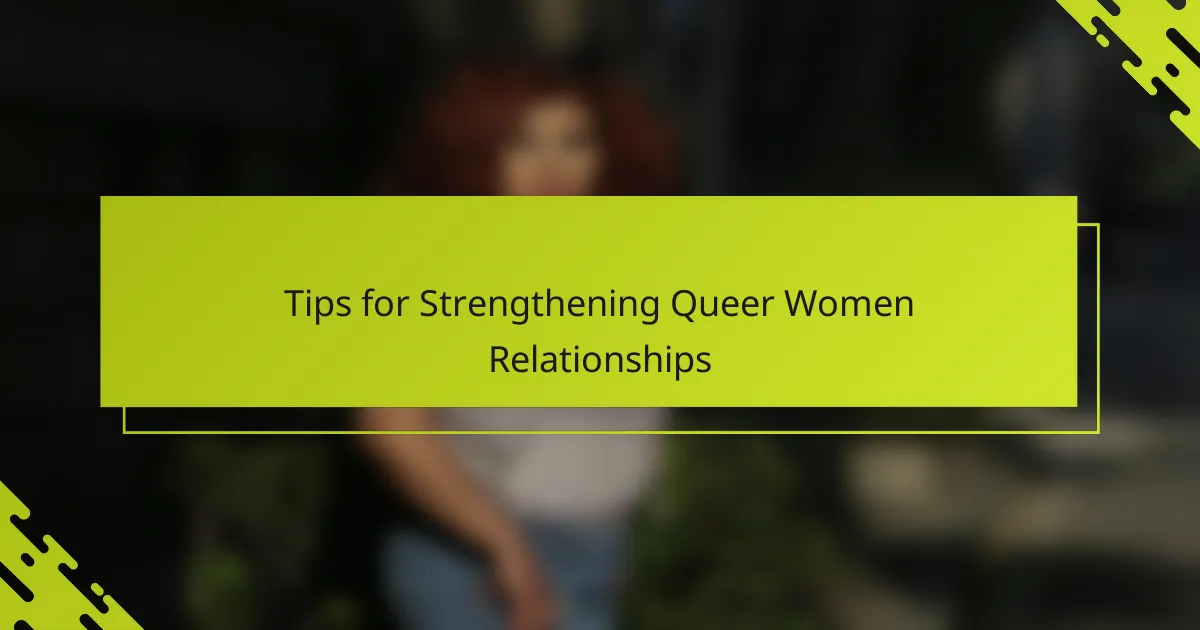
Tips for Strengthening Queer Women Relationships
One thing I’ve learned is how vital it is to practice active listening without jumping to solutions or judgments. When my partner shares something, even if it’s a small frustration or a tired thought, just holding space and truly hearing her makes a huge difference. Have you ever noticed how simply feeling heard can soften tensions and deepen trust?
Another tip I’ve found invaluable is dedicating moments in our day to check in on how we’re feeling—not just about each other but about ourselves. It’s easy to get caught up in busy routines, yet these brief emotional check-ins help prevent misunderstandings from piling up. I often ask, “What’s on your heart right now?” and it opens a dialogue that feels safe and honest.
Lastly, cultivating gratitude showed me how powerful noticing the good, even in tiny gestures, can be. Saying “thank you” or pointing out something I appreciate about my partner shifts our focus to connection rather than conflict. Isn’t it amazing how that simple act can light up a relationship and remind both of us why we chose each other?
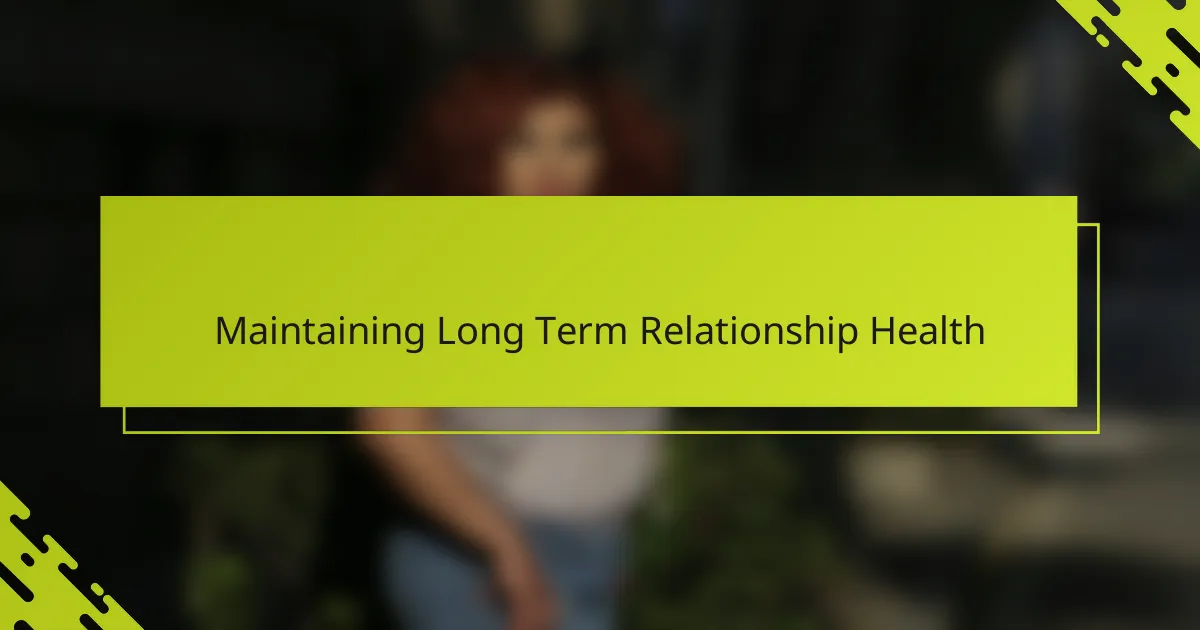
Maintaining Long Term Relationship Health
Keeping a long-term relationship healthy isn’t about grand gestures; it’s really the steady accumulation of small, positive moments. I found that consistently showing appreciation—even for the tiniest thing, like making coffee or sharing a funny story—made my partner and me feel more connected. Have you ever noticed how those little acknowledgments quietly build a reservoir of goodwill that helps during tougher times?
I’ve also learned that maintaining emotional safety is crucial. When conflicts arise, pausing to reflect on what I’m feeling instead of reacting right away helped us avoid spiraling into old patterns. It wasn’t easy at first, but creating that space for calm dialogue made me realize how much patience and empathy contribute to lasting love.
One question I often ask myself is: Are we still nurturing curiosity about each other? Over time, it’s tempting to assume we know everything, but I’ve found that asking simple questions—like about a dream or a new interest—rekindles intimacy in unexpected ways. Isn’t it refreshing to keep discovering who your partner is, even years into the relationship?
